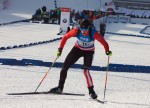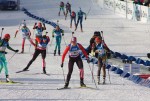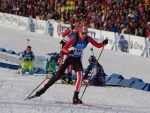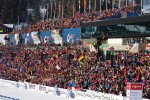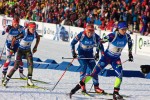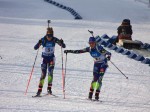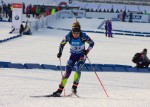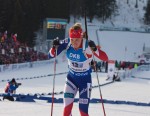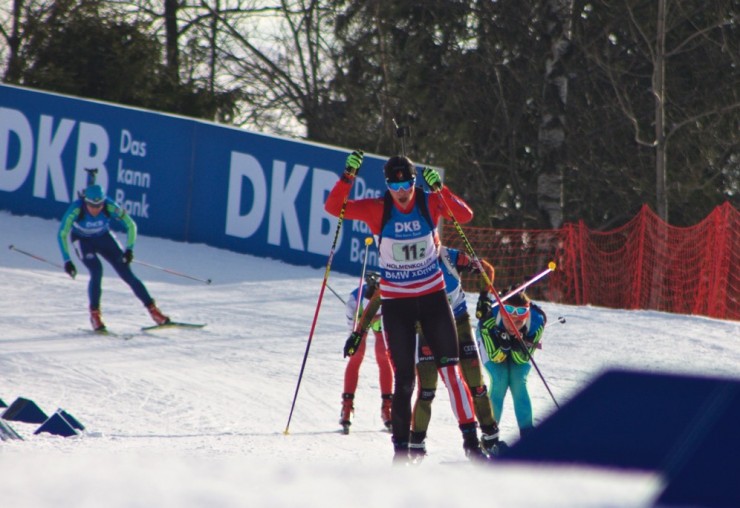
OSLO, Norway — At the halfway point of Friday’s World Championships women’s 4 x 6-kilometer relay, one woman was feeling better than she had all week.
It was Rosanna Crawford of Canada, and she attacked her way to the lead of the race.
“It felt so good out there today,” she said after tagging off. “Just like, I could attack, and I didn’t die on the last loop. It was pretty exciting to pass the leader and be in the lead. I haven’t done that in a long time. So, it was a lot of fun.”
Canada eventually ended up 15th, ceding the lead to France and then Norway, which ultimately took home a much-desired gold on home turf. The Canadians finished 4:48.6 back.
Julia Ransom had led off for the team, and used one spare in each shooting stage. In her first full season on the World Cup, Ransom is getting used to the leadoff position and was satisfied to tag off in 13th place – not where the team wanted to finish place-wise, but time-wise close enough to the leaders with just 37.6 seconds separating them from first place.
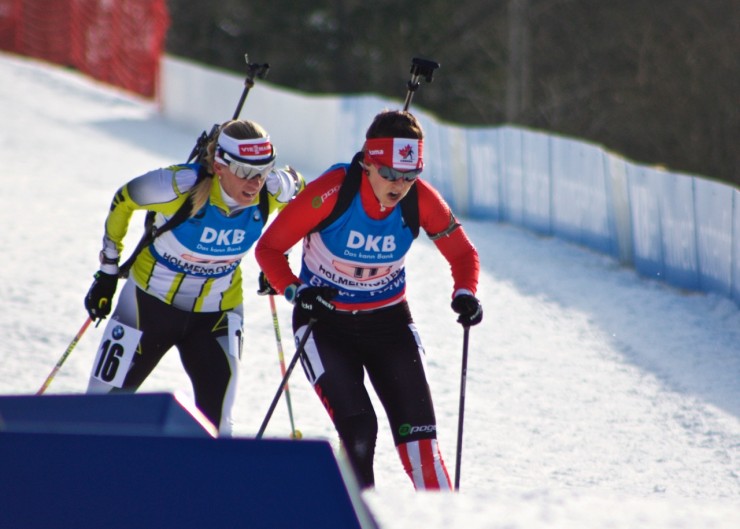
“Of course I would have loved to have cleaned a bout,” Ransom said. “But it was what it was. My legs are ready to have a bit of a break.”
But she had done her job, as teammate Crawford would later say.
“Julia did a great job, just 1+1 is good and taking off within 30 seconds is super-awesome,” Crawford said. “So she did her part. Everyone just has to do their part… with [relays and] mixed relays we [Julia and I] know how to do the first and second legs. I am confident and I trust Julia to lead us off with a good start.”
As several women remarked, the start was particularly physical for a race in the women’s field. There were multiple crashes and broken poles, and Ransom had to hold her ground.
“It was fun to be in the mix,” she said. “I love starting because it’s so different, and today especially was incredibly aggressive. A lot of elbows out there and stomping on poles. The girls had their talons out — I’ve started every relay this year, and every day there’s something new. There was one day that I broke a pole right off the start, another day that I crashed. I’m taking a little something from each race.”
The physicality seemed to die down a bit on leg two, or at least return to normal levels. Crawford cleaned prone with no spare rounds to move up to ninth and inch seconds closer to the leaders, and then used just one spare round in standing and left the range in sixth.
From there, Crawford went into attack mode.
“On the top of the hill [behind the stadium] I caught back up to the lead group, and then I just decided that I felt good and you get a big rest after that, and I hammered a little bit to pass them,” Crawford said. “Catch up to third, and then down the hill my skis were running really well so I passed Germany and just tried to hold onto the front until I tagged off to Sarah [Beaudry].”
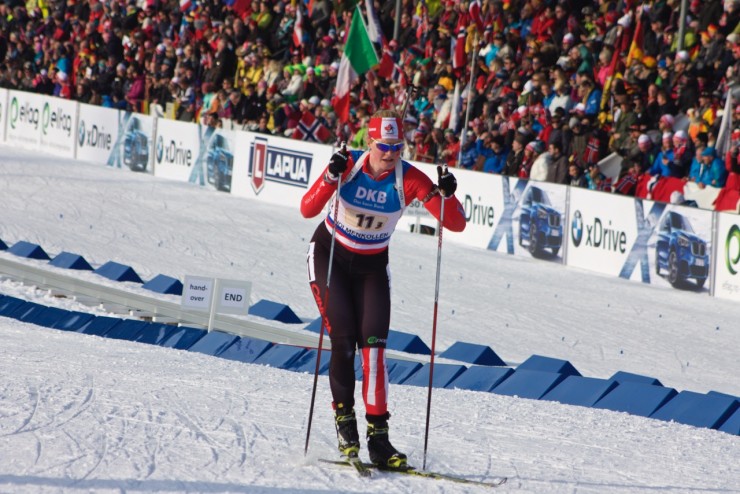
For Beaudry, in her first-ever senior World Championships and about a week away from her 22nd birthday, receiving the tag in first place was something of a surprise.
She also used another “s” word to describe it.
“I don’t want to say scary, but wow, I wasn’t expecting this,” Beaudry said after finishing her leg of the relay. “The whole [first] loop, I was like‚ ‘Are they coming?’ I was skiing scared that someone might overtake me. I was happy I stayed in the front, and not just get completely annihilated in the first lap. It was too bad, because I came out after my prone not with anybody. I was trying to catch the two girls ahead of me.”
Beaudry used two spares in prone, leaving the range in eighth, and then cleaned standing to move up to sixth. Her last loop was not without adversity.
“I wasn’t feeling great on the skis,” she said. “Last lap it was really hard. And then the Italian girl [Alexia Runggaldier] passed me and then I crashed. That hurt quite a bit — I couldn’t get up and couldn’t keep skiing and was like ‘OW!’ But then I just got it in. Too bad going out with a lead, not that big but going out first, and then coming in in ninth.”
Still, Beaudry didn’t feel as if skiing her first loop all alone out in front on the course had changed her pace or made her ski too fast. She was able to enjoy a bit of the atmosphere, even if it was stressful, and the adrenaline didn’t wreck her race.
“It is typical for me to go out too quickly,” she laughed. “So that being said, I feel like I would have gone out at a similar pace anyway. Maybe I shouldn’t have gone this fast, but I mean, I probably shouldn’t have gone out this fast on any of my first laps this year. I wouldn’t say I did it differently because I was in the lead.”
Despite Beaudry’s last-lap woes, Canada was still in ninth place and just under a minute and a half from the lead.
After Zina Kocher took over and used all six spare rounds as well as skiing three penalty loops, they had dropped to 15th and finished 4:48.6 behind.
Norway Wins at Home
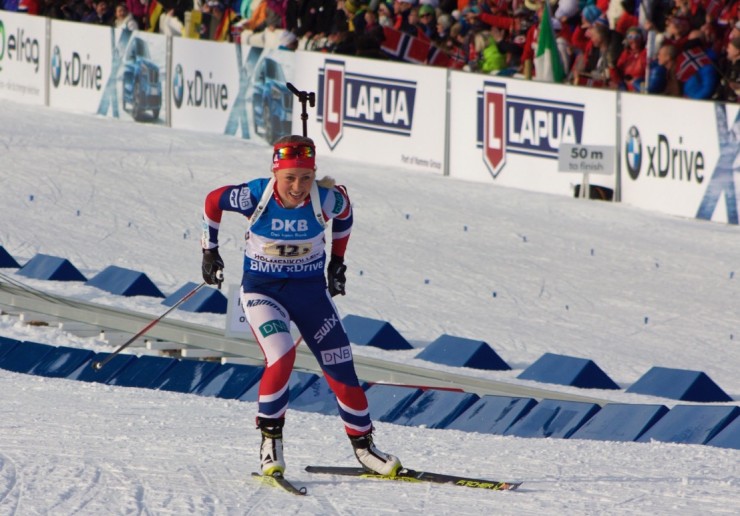
While Canada was slipping through the standings, Norway was rising, much to the delight of the Holmenkollen crowd. First and second skiers Synnøve Solemdal and Fanny Horn Birkeland had kept the team in contention, tagging off 13.4 and 12.4 seconds from the leaders, respectively.
It was Tiril Eckhoff, the gold medalist from the sprint, who skied third for Norway and brought the team to the front.
Eckhoff was ferocious, shooting perfectly and skiing the fastest time of all the third-leg skiers by 22 seconds over just six kilometers. She tagged off to Marte Olsbu with a 23.2-second lead.
And like Beaudry before her, Olsbu was facing a pressure that she perhaps did not expect. Norway had finished no better than fifth in any women’s relay this season, and after dropping the race at the Presque Isle World Cup started today’s competition with bib 12.
With a career-best week so far – in her second World Championships ever, she finished eleventh in the sprint and turned in a strong leg in the mixed relay – Olsbu was new to the anchor position, but the choice proved genius.
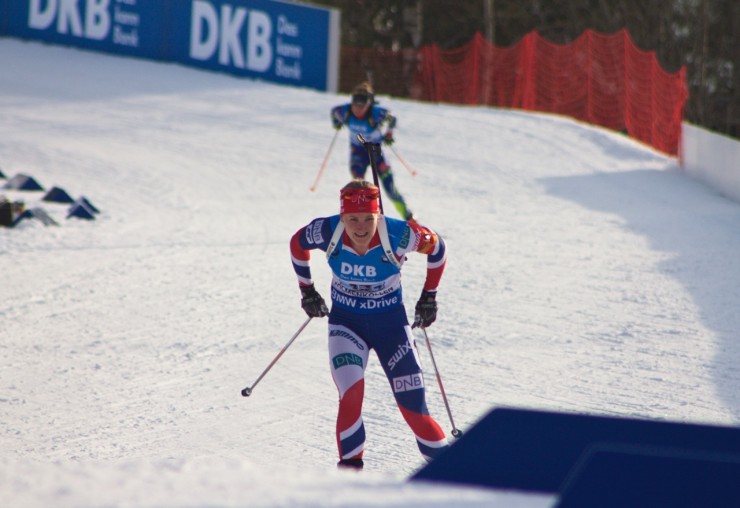
She used two spares in each stage, and was helped by errors from some of her competitors as well, allowing her to stay in the lead. Olsbu was able to hold on during the last loop despite a hard chase from Marie Dorin Habert of France, who had won gold in the 15 k individual just two days before and is widely acknowledged to be one of the most fearsome skiers on the circuit.
When asked by the IBU’s Jerry Kokesh if they were ever worried that they would not win gold, Olsbu raised her eyes wide and said, “I was!”
“I just went as fast as I could on the last loop, and I was so happy when I crossed the finish line in first,” Olsbu, who ended up with just a 5.3 second margin ahead of Dorin Habert, said in the press conference.
Of all the gold medals at World Championships, this was one that Norway did not expect to win. The women were ecstatic that they could pull it off.
“Last time we were big favorites,” Solemdal said of her role in the team’s 2013 World Championships gold medal with Tora Berger and Ann Kristin Flatland. “And this time we were not good at all. So I feel like it’s, we have worked so hard the whole team, for such a long time to be good in the relay. For me it’s the greatest feeling to take home the gold at home in Oslo.”
— Harald Zimmer contributed reporting.
Chelsea Little
Chelsea Little is FasterSkier's Editor-At-Large. A former racer at Ford Sayre, Dartmouth College and the Craftsbury Green Racing Project, she is a PhD candidate in aquatic ecology in the @Altermatt_lab at Eawag, the Swiss Federal Institute of Aquatic Science and Technology in Zurich, Switzerland. You can follow her on twitter @ChelskiLittle.

